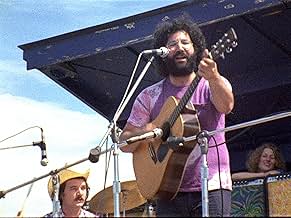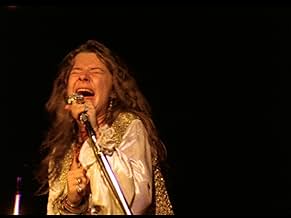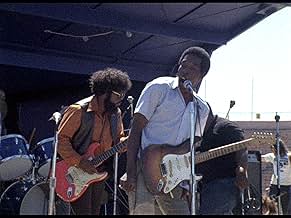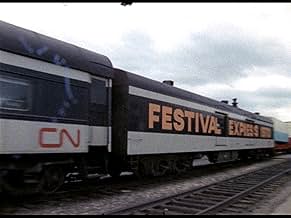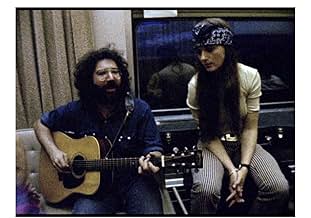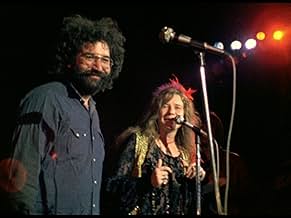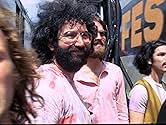ÉVALUATION IMDb
7,5/10
2,5 k
MA NOTE
Ajouter une intrigue dans votre langueThe filmed account of a large Canadian rock festival train tour boasting major acts like Janis Joplin, The Grateful Dead and The Band.The filmed account of a large Canadian rock festival train tour boasting major acts like Janis Joplin, The Grateful Dead and The Band.The filmed account of a large Canadian rock festival train tour boasting major acts like Janis Joplin, The Grateful Dead and The Band.
- Prix
- 1 victoire et 2 nominations au total
Janis Joplin
- Self - Janis Joplin & The Full Tilt Boogie Band
- (archive footage)
Grateful Dead
- Themselves
- (as The Grateful Dead)
Avis en vedette
I recommend this film not only because I am a fan of most of the people that gave performances, but the creator of the film captured footage of the performers that was exceptionally good. The "young" Grateful Dead gave a tighter performance than I had ever seen them perform live. "The Band" also surprised me. They performed very well and they too seemed tighter than when I saw them live 30-plus years ago. However, Janis stole the show. She was wonderful! You must see the movie just for her performances alone. What a trip! The in between shots of all the musicians riding on the train was fun and full of energy and a real bonus to the film (the concert footage was enough to bring me in to see the movie). If you are a fan of the 60's and you enjoy Janis Joplin and the Grateful Dead, you must see this film. The only time I felt disappointed was when the movie ended. I could easily have watched two or three more hours of concert footage.
I'm a little baffled by some of the comments here regarding the film making style or skill in this film. I watched the film to see Janis and the Grateful Dead and The Band -- happy, young, and exuberant, and that's exactly what I got. I even liked the footage of the promoter talking about the festival and the issues with the crowds.
ANYWAY... I recommend the DVD over the theatrical release, since everyone here seems to mention that they want to see more musical performances, and the DVD delivers. There are two DVD disks -- the movie disk and the extras disk. On the MOVIE disk, go to the menu and select "extras" and there are a dozen additional music performances from Janis, the Grateful Dead, Flying Burrito Brothers, and others. (I hear that the extras disk contains interviews with the director, but I haven't seen it). Enjoy!
ANYWAY... I recommend the DVD over the theatrical release, since everyone here seems to mention that they want to see more musical performances, and the DVD delivers. There are two DVD disks -- the movie disk and the extras disk. On the MOVIE disk, go to the menu and select "extras" and there are a dozen additional music performances from Janis, the Grateful Dead, Flying Burrito Brothers, and others. (I hear that the extras disk contains interviews with the director, but I haven't seen it). Enjoy!
Oh . . . My . . . God!
Yer gonna die! 33 years from filming to the screen. But here it is!
If you like The Grateful Dead, Janis Joplin, The Band, and/or that era, A) you're gonna Love this, and B) as a documentary of the time this is rivaled only by Woodstock.
In fact, there's a quote by some musician in the film about: "Woodstock was a treat for the audience; the Festival Express was a treat for the performers." Apparently it was a non-stop jam session & party from beginning to end. Buddy Guy jokes, "I couldn't go to sleep cuz I thought I'd miss something!" The Grateful Dead's lyricist Robert Hunter later wrote a song about it -- "Never had such a good time in my life before / I'd like to have it one time more." And Janis says at the last show, "Next time you throw a train, man, call me."
This was a rock festival "tour" across Canada in the summer of 1970. The idea was to create Multiple mini-Woodstocks by having a train take all the bands to the next site. They ended up pulling off three of them - in Toronto, Winnipeg, and Calgary. But this being Canada in the last century, there's only like 5 or 10,000 people in the Peg and Cowtown!
The guy who was in charge of filming it back then told me they had 5 cameramen and a total crew of about 20. There was apparently a dispute over who owned the film, resulting in all this great footage never being seen, and reminding me of the similar squabbles over that other great cinema verite classic Pull My Daisy by Robert Frank. Both Daisy and this Express really document their respective peaks in creative history vibrantly & honestly, showing both the crazy drunken joyride and the brilliant peaks of pure channeled genius.
Other films in this chapter would include Monterey Pop, The Last Days of The Fillmore, Big Sur, then The Last Waltz a few years later. They sometimes use split-screens to show both the audience and the performers, and apparently the director who finally turned the footage into a film also did the Beatles Anthology, so it's kind of like that - all this historic footage interspersed with new interview snippets by the various participants, like Bob Weir remembering, "Most all of us were new to drinking at that point. We'd all been taking LSD or smoking pot or whatever, but this was a whole new experience for us!" Ah, Canada!
And talk about Big Railroad Booze -- there's a hilarious part where they run out in Saskatchewan: CN Conductor: They drank us dry! Promoter: When's the next stop? Conductor: We're not scheduled for a stop. Promoter: You are now.
Then Eric Andersen looking back, shakin his head, "I dunno, they just stopped in Saskatoon, the whole damn train stopped, like, In Front of a liquor store!"
It's one of those movies where you're laughing so hard you miss stuff, or you're so busy watching Rick Danko you forget Janis and Jerry are beside him. It's filled with so many glistening gold treasures you're gonna come away richer just watching it. Masters channeling some force beyond . . . makes me think of people I've met who don't believe there's a God of any kind, no larger spiritual anything. This movie sure reinforced for me that there's Some spirit force out there, and Rick Danko and Janis and Richard Manuel are channeling it right before your eyes!
And Deadheads are gonna freak! There are 3 songs by the original 6-member band, but more importantly, Jerry Garcia is really shown in his prime. Not only is he central to seemingly every train-car jam, but when there's trouble with the crowds in Toronto, it's Garcia who comes to the microphone to plead for "coolness". I believe it's the new Dennis McNally book on the Dead that says Garcia learned their eventual staple Goin' Down The Road Feelin' Bad from Delaney & Bonnie on this trip, and you actually see Delaney playing it on the train at one point.
Janis is so possessed & clearly channeling The Big Guy to close the final show of the tour and the film, it's so sad this lifeforce died accidentally just 2 months later. People were literally crying in the theater at her performance. I mean, the audience was so captivated, they broke out in applause Mid-song when she came back from her spontaneous stage rap to nail Cry Baby at the Winnipeg show.
And this is by far the loosest and rockingest original Band I've ever seen or heard. The Last Waltz is of course white hot, but they're polished to perfection. This is The Band of the Basement Tapes, except playing in their home country and even more electrified - they're hanging with the Dead on the road, not Dylan in a basement :-) It's the kind of stuff you always wished you saw or were there for. Now, Bing!
I caught it at the Toronto Film Festival (Sept. '03) and sure hope for everyone's sake this finds wide distribution, then an excellent DVD avec outtakes comes out!
Yer gonna die! 33 years from filming to the screen. But here it is!
If you like The Grateful Dead, Janis Joplin, The Band, and/or that era, A) you're gonna Love this, and B) as a documentary of the time this is rivaled only by Woodstock.
In fact, there's a quote by some musician in the film about: "Woodstock was a treat for the audience; the Festival Express was a treat for the performers." Apparently it was a non-stop jam session & party from beginning to end. Buddy Guy jokes, "I couldn't go to sleep cuz I thought I'd miss something!" The Grateful Dead's lyricist Robert Hunter later wrote a song about it -- "Never had such a good time in my life before / I'd like to have it one time more." And Janis says at the last show, "Next time you throw a train, man, call me."
This was a rock festival "tour" across Canada in the summer of 1970. The idea was to create Multiple mini-Woodstocks by having a train take all the bands to the next site. They ended up pulling off three of them - in Toronto, Winnipeg, and Calgary. But this being Canada in the last century, there's only like 5 or 10,000 people in the Peg and Cowtown!
The guy who was in charge of filming it back then told me they had 5 cameramen and a total crew of about 20. There was apparently a dispute over who owned the film, resulting in all this great footage never being seen, and reminding me of the similar squabbles over that other great cinema verite classic Pull My Daisy by Robert Frank. Both Daisy and this Express really document their respective peaks in creative history vibrantly & honestly, showing both the crazy drunken joyride and the brilliant peaks of pure channeled genius.
Other films in this chapter would include Monterey Pop, The Last Days of The Fillmore, Big Sur, then The Last Waltz a few years later. They sometimes use split-screens to show both the audience and the performers, and apparently the director who finally turned the footage into a film also did the Beatles Anthology, so it's kind of like that - all this historic footage interspersed with new interview snippets by the various participants, like Bob Weir remembering, "Most all of us were new to drinking at that point. We'd all been taking LSD or smoking pot or whatever, but this was a whole new experience for us!" Ah, Canada!
And talk about Big Railroad Booze -- there's a hilarious part where they run out in Saskatchewan: CN Conductor: They drank us dry! Promoter: When's the next stop? Conductor: We're not scheduled for a stop. Promoter: You are now.
Then Eric Andersen looking back, shakin his head, "I dunno, they just stopped in Saskatoon, the whole damn train stopped, like, In Front of a liquor store!"
It's one of those movies where you're laughing so hard you miss stuff, or you're so busy watching Rick Danko you forget Janis and Jerry are beside him. It's filled with so many glistening gold treasures you're gonna come away richer just watching it. Masters channeling some force beyond . . . makes me think of people I've met who don't believe there's a God of any kind, no larger spiritual anything. This movie sure reinforced for me that there's Some spirit force out there, and Rick Danko and Janis and Richard Manuel are channeling it right before your eyes!
And Deadheads are gonna freak! There are 3 songs by the original 6-member band, but more importantly, Jerry Garcia is really shown in his prime. Not only is he central to seemingly every train-car jam, but when there's trouble with the crowds in Toronto, it's Garcia who comes to the microphone to plead for "coolness". I believe it's the new Dennis McNally book on the Dead that says Garcia learned their eventual staple Goin' Down The Road Feelin' Bad from Delaney & Bonnie on this trip, and you actually see Delaney playing it on the train at one point.
Janis is so possessed & clearly channeling The Big Guy to close the final show of the tour and the film, it's so sad this lifeforce died accidentally just 2 months later. People were literally crying in the theater at her performance. I mean, the audience was so captivated, they broke out in applause Mid-song when she came back from her spontaneous stage rap to nail Cry Baby at the Winnipeg show.
And this is by far the loosest and rockingest original Band I've ever seen or heard. The Last Waltz is of course white hot, but they're polished to perfection. This is The Band of the Basement Tapes, except playing in their home country and even more electrified - they're hanging with the Dead on the road, not Dylan in a basement :-) It's the kind of stuff you always wished you saw or were there for. Now, Bing!
I caught it at the Toronto Film Festival (Sept. '03) and sure hope for everyone's sake this finds wide distribution, then an excellent DVD avec outtakes comes out!
Before seeing this film, I was a completely novice to The Band, Grateful Dead, Janis. I'm 22, I didn't grow up with this stuff, my only knowledge of The Band is that Scorcese directed a film on their last concert. I have a few hippie friends that endless blathered about the brilliance of Janis, which fell upon my deaf ears. I was expecting Festival Express to be this dull, venture into 70's nostalgia crap and tedious jam band boredom.
Oh...how my opinion has changed. I mean, its nothing like the music I love (90's alternative stuff and electronic stuff) but the performances are so absolutely incredible and passionate. In reality, its a film for musicians more than fans, people that who have, even for a moment, felt the sheer exhilaration of collaborating musically with people and it being perfect! Festival Express feels exactly like that. You see it in their eyes in these performances. Janis may have been.....kind of crazy, but in the track in the film ("cry baby"?) I can completely see her absolute passion for music and her amazing showmanship (or show-womanship). Festival Express is the best example of a completely non-contrived and purely candid look into these bands. Even if they are brief glimmers of their natural selves.
I think the die-hard fans who are criticizing the film are asking too much. If I can wait 30 years after the demise of my favorite bands (Radiohead, Tool, Nine Inch Nails)...to see an amazingly honest and brilliantly shot look into their touring lives, I would be very very grateful, not critical because the damned filmmakers didn't get everything I wanted. The interviews with the performers and particularly the promoter, are fantastic. Not only are they a good dose of humour, but...its so easy to see WHY they are saying this tour was absolutely special and unique and memorable. It's right there on film, this was the pinnacle of that era and that place and that mentality and musicianship that was going on. You have to appreciate what Festival Express showcases. You might not like every bit of music (I didn't) but I can appreciate the total intensity and passion of the performances.
Oh...how my opinion has changed. I mean, its nothing like the music I love (90's alternative stuff and electronic stuff) but the performances are so absolutely incredible and passionate. In reality, its a film for musicians more than fans, people that who have, even for a moment, felt the sheer exhilaration of collaborating musically with people and it being perfect! Festival Express feels exactly like that. You see it in their eyes in these performances. Janis may have been.....kind of crazy, but in the track in the film ("cry baby"?) I can completely see her absolute passion for music and her amazing showmanship (or show-womanship). Festival Express is the best example of a completely non-contrived and purely candid look into these bands. Even if they are brief glimmers of their natural selves.
I think the die-hard fans who are criticizing the film are asking too much. If I can wait 30 years after the demise of my favorite bands (Radiohead, Tool, Nine Inch Nails)...to see an amazingly honest and brilliantly shot look into their touring lives, I would be very very grateful, not critical because the damned filmmakers didn't get everything I wanted. The interviews with the performers and particularly the promoter, are fantastic. Not only are they a good dose of humour, but...its so easy to see WHY they are saying this tour was absolutely special and unique and memorable. It's right there on film, this was the pinnacle of that era and that place and that mentality and musicianship that was going on. You have to appreciate what Festival Express showcases. You might not like every bit of music (I didn't) but I can appreciate the total intensity and passion of the performances.
In the summer of 1970, some of the world's premier rock musicians - prime among them The Grateful Dead, The Band and Janis Joplin - got together to perform a series of concerts across southern Canada. Rather than just flying to the various venues then afterwards going their separate ways, the performers boarded a train in Toronto and headed west to Calgary, stopping off at various places to "do their thing" for appreciative audiences. That train ride, which turned into a nonstop jam session among some of the top rock 'n roll talents of the time, became known as the Festival Express and this film is the chronicle of that experience.
"Festival Express" juxtaposes footage of the event with present-day interviews from some of the people who were on that train. We see the musicians jamming together in the cars then performing their sets in open-air stadiums. What the film doesn't show us is any real interpersonal connection or interaction beyond the music. Perhaps the cameras were turned off whenever the performers were talking to one another, or, perhaps, the performers were just too drunk or stoned to say anything of any real interest to one another on the trip. Either way, the film does not provide us with a very compelling behind-the-scenes glimpse into the lives and personalities of these people. That is the biggest disappointment of the movie.
Be that as it may, "Festival Express" is still a useful time capsule for reminding us about what the culture was like 35 years ago. The film does an interesting job capturing the strange moral paradox that has been an intricate part of rock 'n' roll from its earliest days. For although rock music has always derived its power and strength from its anti-establishment stance and attitude, it is also a highly competitive business built on corporate interests, involving record companies, producers, promoters and millionaire performers. So how does one reconcile these two seemingly antithetical positions? How justify high ticket prices or millionaire salaries in an art form that claims as its foundational principle that the corporate establishment is the source of all the evil in the world and the very thing that the music itself is dedicated to stamping out? And how genuine can this anti-establishment attitude really be when what looks on the surface to be spontaneous rebellion is actually the result of shrewdly calculated Madison Avenue exploitation? This conundrum comes to a head in the Toronto stopover where a group of protesters outside the concert are threatening to turn violent if they aren't provided free entrance into the arena (the tickets cost a whopping $14!). These youngsters feel that, because rock claims to be a statement against everything related to money and profits, the purveyors of the message - i.e, the concert promoters and the rock stars themselves - should be willing to forego being paid for their efforts. There's humorous irony in the fact that we see these "radical" anti-establishment musicians ultimately siding with the cops on the issue and against their youthful fans on the outside! The people who were on the train keep telling us what a life-changing and euphoric experience that trip turned out to be. That may well be the case, but due to the lack of intimacy we feel with the performers, that sense doesn't really come across very effectively in the film. What the film does provide is a rare opportunity to watch a collection of iconic rock legends performing at the peak of their youth and powers. That alone is what makes "Festival Express" a must-see for aficionados.
"Festival Express" juxtaposes footage of the event with present-day interviews from some of the people who were on that train. We see the musicians jamming together in the cars then performing their sets in open-air stadiums. What the film doesn't show us is any real interpersonal connection or interaction beyond the music. Perhaps the cameras were turned off whenever the performers were talking to one another, or, perhaps, the performers were just too drunk or stoned to say anything of any real interest to one another on the trip. Either way, the film does not provide us with a very compelling behind-the-scenes glimpse into the lives and personalities of these people. That is the biggest disappointment of the movie.
Be that as it may, "Festival Express" is still a useful time capsule for reminding us about what the culture was like 35 years ago. The film does an interesting job capturing the strange moral paradox that has been an intricate part of rock 'n' roll from its earliest days. For although rock music has always derived its power and strength from its anti-establishment stance and attitude, it is also a highly competitive business built on corporate interests, involving record companies, producers, promoters and millionaire performers. So how does one reconcile these two seemingly antithetical positions? How justify high ticket prices or millionaire salaries in an art form that claims as its foundational principle that the corporate establishment is the source of all the evil in the world and the very thing that the music itself is dedicated to stamping out? And how genuine can this anti-establishment attitude really be when what looks on the surface to be spontaneous rebellion is actually the result of shrewdly calculated Madison Avenue exploitation? This conundrum comes to a head in the Toronto stopover where a group of protesters outside the concert are threatening to turn violent if they aren't provided free entrance into the arena (the tickets cost a whopping $14!). These youngsters feel that, because rock claims to be a statement against everything related to money and profits, the purveyors of the message - i.e, the concert promoters and the rock stars themselves - should be willing to forego being paid for their efforts. There's humorous irony in the fact that we see these "radical" anti-establishment musicians ultimately siding with the cops on the issue and against their youthful fans on the outside! The people who were on the train keep telling us what a life-changing and euphoric experience that trip turned out to be. That may well be the case, but due to the lack of intimacy we feel with the performers, that sense doesn't really come across very effectively in the film. What the film does provide is a rare opportunity to watch a collection of iconic rock legends performing at the peak of their youth and powers. That alone is what makes "Festival Express" a must-see for aficionados.
Le saviez-vous
- AnecdotesThere were two bands, Traffic and Ten Years After, that were on the Festival Express tour but are not seen in the movie. The producers of the film could not get the musical rights.
- Citations
Self - Interviewee: [promoter] We're going to get a whole bunch of acts together and do a big festival. And rather than do it at one site, I said, we're gonna travel the country on a private train.
- Bandes originalesCasey Jones
From the Album "Workingman's Dead"
Performed by Grateful Dead
Written by Jerry Garcia (as J. Garcia) / Robert Hunter (as R. Hunter)
Published by Ice Nine Publishing Company, Inc.
Courtesy of Warner Bros. Records Inc.
by arrangement with Warner Strategic Marketing
Meilleurs choix
Connectez-vous pour évaluer et surveiller les recommandations personnalisées
- How long is Festival Express?Propulsé par Alexa
Détails
- Date de sortie
- Pays d’origine
- Site officiel
- Langue
- Aussi connu sous le nom de
- Фестивальный экспресс
- Lieux de tournage
- sociétés de production
- Consultez plus de crédits d'entreprise sur IMDbPro
Box-office
- Brut – États-Unis et Canada
- 1 174 079 $ US
- Fin de semaine d'ouverture – États-Unis et Canada
- 12 074 $ US
- 25 juill. 2004
- Brut – à l'échelle mondiale
- 1 281 754 $ US
- Durée1 heure 30 minutes
- Couleur
- Mixage
- Rapport de forme
- 1.85 : 1
Contribuer à cette page
Suggérer une modification ou ajouter du contenu manquant

Lacune principale
By what name was Festival Express (2003) officially released in India in English?
Répondre

